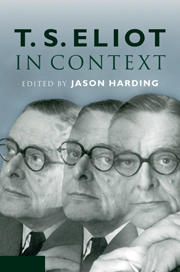Book contents
- Frontmatter
- Contents
- List of illustrations
- List of contributors
- Acknowledgements
- List of abbreviations
- Introduction
- PART ONE LIFE
- PART TWO FORMS
- PART THREE LITERARY CROSS-CURRENTS
- 16 Allusion: the case of Shakespeare
- 17 Classics
- 18 Dante
- 19 Seventeenth-century literature
- 20 Romantic and Victorian poetry
- 21 French poetry
- 22 Georgian poetry
- 23 Bloomsbury
- 24 Ezra Pound
- 25 The avant-garde
- PART FOUR POLITICS, SOCIETY AND CULTURE
- PART FIVE RECEPTION
- Further reading
- Index
17 - Classics
Published online by Cambridge University Press: 05 August 2012
- Frontmatter
- Contents
- List of illustrations
- List of contributors
- Acknowledgements
- List of abbreviations
- Introduction
- PART ONE LIFE
- PART TWO FORMS
- PART THREE LITERARY CROSS-CURRENTS
- 16 Allusion: the case of Shakespeare
- 17 Classics
- 18 Dante
- 19 Seventeenth-century literature
- 20 Romantic and Victorian poetry
- 21 French poetry
- 22 Georgian poetry
- 23 Bloomsbury
- 24 Ezra Pound
- 25 The avant-garde
- PART FOUR POLITICS, SOCIETY AND CULTURE
- PART FIVE RECEPTION
- Further reading
- Index
Summary
T. S. Eliot made repeated, polemical, and idiosyncratic use of the word ‘classic’ and its cognates ‘classical’ and ‘classicism’ in his prose writings. In the earlier part of his career, he tended to use the term not to refer to writing in Latin and Greek (the Classics) or even to canonical texts in a wider range of languages, but as a call to arms. In his critical lexicon of the 1910s and 1920s, ‘classicism’ meant writing that was intelligently organised, mature, well proportioned and impersonal rather than gushingly emotional, personal or vague; and the opposite of ‘classicism’ was ‘romanticism’. Both terms are to be understood primarily as formal and stylistic rather than temporal distinctions. Andrew Marvell is a ‘classic in a sense which [Thomas] Gray and [William] Collins are not’ because of his sense of argumentative and aesthetic ‘equipoise, a balance and proportion of tones’ (SE, 302). Charles Baudelaire's poetry may superficially appear classical, but a subtle ‘inner disorder’ means that it has ‘the external but not the internal form of classic art’ (SE, 423–4).
In an essay on John Milton – the most classically educated and classicising of English poets – Eliot again withholds the label: his style is baroque, ‘peculiar’, and too divorced from common speech, ‘it is a style of a language still in formation’ (OPP, 58). The 1923 essay ‘Ulysses, Order, and Myth’ may ostensibly be about James Joyce's use of Homeric myth to structure the chaos of modern life, but it is also a personal intervention in literary politics: ‘I think that Mr Aldington and I are more or less agreed as to what we want in principle, and agreed to call it classicism’ (SP, 176).
- Type
- Chapter
- Information
- T. S. Eliot in Context , pp. 169 - 179Publisher: Cambridge University PressPrint publication year: 2011
- 2
- Cited by



